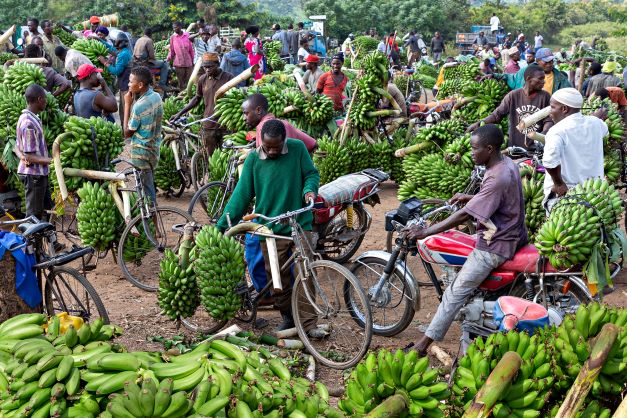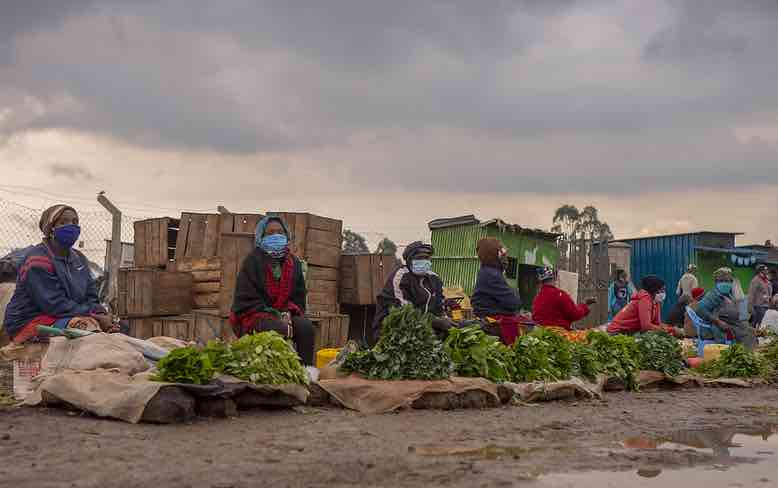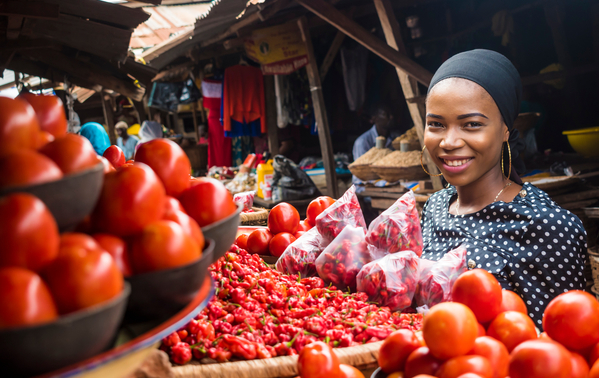By John Ulimwengu
In February 2022, war erupted between Russia and Ukraine. These two countries account for about 12 percent of the total calories traded in the world, raising serious concerns about the implications for global food security. Although it is too early to draw a conclusion regarding the world’s capacity to absorb these stressors, past trends, early macroeconomic impacts, and policy responses can provide a glimpse of possible impacts.
For Africa, which is still recovering from the socio-economic repercussions of the COVID-19 pandemic, the Russia-Ukraine conflict poses a major threat to food security. Wheat consumption in Africa is projected to reach 76.5 million tons by 2025, of which 48.3 million tons or 63.4 percent is projected to be imported outside the Continent. Russia and Ukraine are major players in the export of wheat and sunflower to Africa, with 32 percent of total African wheat imports coming from Russia and 12 percent from Ukraine. North Africa (Algeria, Egypt, Libya, Morocco, and Tunisia), Nigeria in West Africa, Ethiopia and Sudan in East Africa, and South Africa account for 80 per cent of wheat imports.
State of food security in Africa
As of 2021, about 282 million people in Africa (20 percent of the population) are facing food insecurity and are undernourished, more than double the share in any other region of the world. Countries in central and southern Africa have the largest populations in IPC Crisis or higher levels of food insecurity (45.6 million people, or 18.4 percent of the population), with 9.9 million in Emergency. In eastern Africa, about 43.6 million people (9.8 percent of the population) are in Crisis or worse food insecurity, with 10.1 million in Emergency. In western Africa and the Sahel region, 30.4 million people (8.6 percent of the population) are in Crisis or higher food insecurity, about 42 percent of them in Nigeria.
Impact of the war in Ukraine on Africa
The ongoing war in Ukraine, combined with existing supply chain issues stemming from the COVID-19 pandemic, have contributed to food price increases globally, particularly for cereal grains. These increases have hit especially hard in Africa, where countries rely on cereal imports. This should be a cause of concern, as food insecure nations are politically combustible with the potential to trigger cascading crises. As Oliver Knox from the Washington Post put it, “Russia’s war with Ukraine threatens scores of countries and over 1 billion people with a triple shock — soaring fuel prices, surging food costs and financial turmoil — that can spark political upheaval. And no nation is perfectly secure, no matter how rich or distant from the battlefield.”[1]
There are three impact channels at play here for Africa: food, fuel, and fertilizer prices.[2] Each affect different parts of African food system. Fertilizer has the most direct impact on primary agricultural production costs and productivity. Food price shocks have a more direct and disproportionate impact on agro-processing because they raise the cost of imported inputs (e.g., domestic milling of wheat grain). Fuel price shocks typically have a disproportionate effect on the food transport sector.
These channels also affect different countries and populations in different ways. Rising food prices contribute positively to GDP in countries that export maize, wheat, or oilseeds and where agricultural exports are an important source of foreign exchange earnings (e.g., Tanzania and Zambia). On the other hand, rising fuel and fertilizer prices cause agricultural production costs to increase and productivity to decline, thus contributing indirectly to rising domestic food prices. These increased prices for wheat and edible oils have significant direct and adverse impact on the cost and affordability of calorie heavy foods. In Africa, many households are currently being adversely affected by both rising prices and falling incomes.
Call for a more resilient African food system
The African Common Position on Food Systems highlights key action areas for enhancing the resilience of Africa’s food systems. These areas involve national, regional, and continental interventions and identify needed thematic and sectoral coherence, alignment, and inter-dependences. The position also underscores the urgent need to pursue sustainability and resilience as a means of achieving food systems transformation through (i) strengthening and harnessing Africa’s growing local food markets; (ii) catalyzing rapid expansion in agricultural and food productivity and production; (iii) boosting investment financing for Africa’s food systems transformation agenda; and (iv) ensuring access to safe and nutritious food for all.
Africa needs to develop innovative ways to enhance its road to recovery from shocks and to transform its food system to become more resilient and sustainable. For example, the humanitarian-development-peace (HDP) nexus approach is designed to create the conditions and structures necessary for a comprehensive and inclusive approach to food systems resilience. African production and food systems must also adapt to the impact of climate change through increased investment in soil health, water management, and climate infrastructure to be able to produce more and higher quality agro-food products and to supply those products to other countries through intra-African trade. Digitization and enhanced last mile delivery systems are also critical to the development and transformation of African food systems.
John Ulimwengu is a Senior Research Fellow in IFPRI’s Development Strategies and Governance Unit.
[1] Knox, O. 2022. Fuel, food, finance: Brace for impact from Russia’s Ukraine war. https://www.washingtonpost.com/politics/2022/04/21/fuel-food-finance-brace-impact-russias-ukraine-war/
[2] Channing Arndt, Xinshen Diao, Paul Dorosh, Karl Pauw, James Thurlow, The Ukraine war and rising commodity prices: Implications for developing countries, Global Food Security, Volume 36, 2023, 100680, ISSN 2211-9124,




